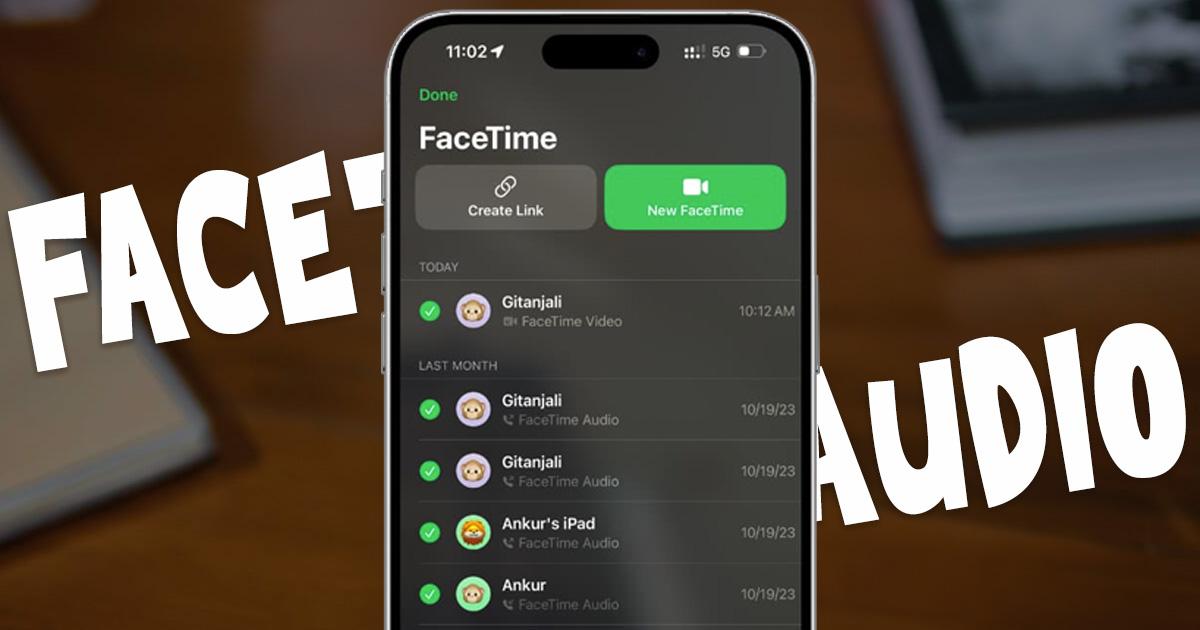Why Choose FaceTime Audio Over Regular Calls

Wondering why you use FaceTime Audio instead of traditional phone calls? FaceTime Audio, Apple’s voice-over-IP (VoIP) audio calling feature, offers compelling advantages for modern communication. Understand why you must use FaceTime audio and what makes it better than a typical phone call.
What is FaceTime audio?
FaceTime Audio is a feature developed by Apple that allows users to make voice calls over the internet using their iOS devices (iPhone, iPad, iPod Touch) or Mac computers. It provides high-quality audio communication between Apple devices, similar to a traditional phone call but utilizing internet connectivity rather than cellular networks.
FaceTime Audio is known for its clear sound quality, integration with other Apple services, and encryption for enhanced privacy and security during calls. It’s a convenient option, especially for users within the Apple ecosystem, offering a reliable alternative to standard phone calls.
Why use FaceTime audio?
Whether you’re an iPhone, iPad, or Mac user, FaceTime Audio provides a range of benefits that make it a must-have tool in your communication arsenal. Here are 10 compelling reasons why you should be using FaceTime Audio:
- Exceptional Audio Quality: FaceTime Audio stands out for its superb sound quality. Using advanced audio technology and prioritizing bandwidth, it offers crystal-clear calls that often exceed the clarity of regular phone calls. Once you experience this quality, it’s hard to go back to traditional calls.
- Seamless Transition Between Video and Audio: FaceTime Audio seamlessly switches between video and audio calls. This flexibility is handy when you need to switch from a video chat to an audio call on the go or while multitasking. You can switch modes without interrupting your conversation, which isn’t possible with regular calls.
- Improved Connectivity in Poor Service Areas: Unlike traditional calls that rely on cell service, FaceTime Audio uses Wi-Fi or cellular data. This makes it more reliable in areas with weak signal, where regular calls may drop or sound distorted.
- Free International Calling: FaceTime Audio allows free international calls between Apple devices connected to Wi-Fi or data. It’s a big money-saver for frequent international callers or travelers, eliminating high international call charges.
- Enhanced Privacy and Security: All FaceTime Audio calls are end-to-end encrypted, ensuring your conversations remain private and secure. This level of security is crucial for sensitive discussions, protecting your data from unauthorized access.
- Compatibility Across Apple Devices: FaceTime Audio works seamlessly across iPhones, iPads, and Macs. You can make and receive calls on any Apple device, creating a unified communication experience.
- Improved Accessibility for Hearing-Impaired Users: The clear audio of FaceTime Audio benefits users with hearing impairments, making conversations easier to follow and participate in.
- Reduced Cellular Data Usage: Unlike traditional calls that use minutes, FaceTime Audio uses data (Wi-Fi or cellular). This is beneficial for users with limited data plans, as calls won’t eat into their monthly allowance.
- Convenient Conference Calling: FaceTime Audio supports group calls, making it easy to connect with multiple people at once. It’s ideal for business meetings or catching up with friends and family without the hassle of multiple calls.
- Seamless Integration with Apple’s Ecosystem: Integrated with Siri, iMessage, and Continuity, FaceTime Audio fits naturally into Apple’s ecosystem. This integration enhances user experience by making communication smoother and more intuitive.
These features make FaceTime Audio a compelling choice for anyone looking to enhance their calling experience with Apple devices.
FaceTime Audio vs. Phone Call
When comparing FaceTime Audio to traditional phone calls, several key differences highlight why FaceTime Audio may be advantageous:
- Audio Quality: FaceTime Audio typically offers superior sound quality compared to regular phone calls. It uses advanced audio codecs and prioritizes bandwidth, resulting in clearer and more consistent audio.
- Connectivity: FaceTime Audio relies on internet connectivity (Wi-Fi or cellular data), whereas traditional phone calls depend on cellular network signal. This means FaceTime Audio can often provide better call quality in areas with poor cellular coverage.
- Cost: FaceTime Audio calls are free when using Wi-Fi, making them a cost-effective option for both local and international calls. In contrast, traditional phone calls may incur charges depending on your carrier and the call destination.
- Security: FaceTime Audio calls are encrypted end-to-end, ensuring privacy and security. Traditional phone calls may be susceptible to interception or eavesdropping, especially on unsecured networks.
- Integration: FaceTime Audio integrates seamlessly with other Apple services and devices, such as iMessage and Siri, enhancing user convenience within the Apple ecosystem. Traditional phone calls do not offer this level of integration.
- Accessibility: FaceTime Audio may be more accessible for users with hearing impairments due to its superior audio quality and clarity.
FaceTime Audio provides a modern, feature-rich alternative to traditional phone calls, particularly beneficial for users within the Apple ecosystem seeking enhanced audio quality, privacy, and integration across devices.
Is FaceTime audio better than calling?
FaceTime Audio is a versatile tool for communication that brings several advantages over regular phone calls. It offers clear sound quality, works smoothly with Apple devices, and saves money on calls. Whether you’re chatting locally or internationally, switching between video and audio calls, or just wanting a better calling experience overall, FaceTime Audio is a smart addition to your communication options if you own Apple devices.
